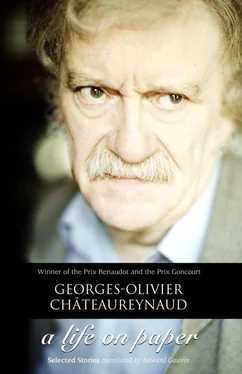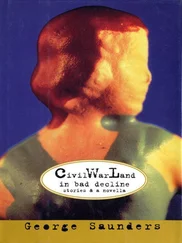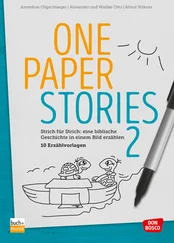Georges-Olivier Chateaureynaud - A Life on Paper - Stories
Здесь есть возможность читать онлайн «Georges-Olivier Chateaureynaud - A Life on Paper - Stories» весь текст электронной книги совершенно бесплатно (целиком полную версию без сокращений). В некоторых случаях можно слушать аудио, скачать через торрент в формате fb2 и присутствует краткое содержание. Год выпуска: 2010, Жанр: Современная проза, на английском языке. Описание произведения, (предисловие) а так же отзывы посетителей доступны на портале библиотеки ЛибКат.
- Название:A Life on Paper: Stories
- Автор:
- Жанр:
- Год:2010
- ISBN:нет данных
- Рейтинг книги:4 / 5. Голосов: 1
-
Избранное:Добавить в избранное
- Отзывы:
-
Ваша оценка:
- 80
- 1
- 2
- 3
- 4
- 5
A Life on Paper: Stories: краткое содержание, описание и аннотация
Предлагаем к чтению аннотацию, описание, краткое содержание или предисловие (зависит от того, что написал сам автор книги «A Life on Paper: Stories»). Если вы не нашли необходимую информацию о книге — напишите в комментариях, мы постараемся отыскать её.
A Life on Paper
A Life on Paper: Stories — читать онлайн бесплатно полную книгу (весь текст) целиком
Ниже представлен текст книги, разбитый по страницам. Система сохранения места последней прочитанной страницы, позволяет с удобством читать онлайн бесплатно книгу «A Life on Paper: Stories», без необходимости каждый раз заново искать на чём Вы остановились. Поставьте закладку, и сможете в любой момент перейти на страницу, на которой закончили чтение.
Интервал:
Закладка:
A discreet cough made him jump. He turned around. In the lunar clarity, he made out a woman of about thirty with a small boy.
"Excuse me, sir, but are you going to use-"
Orne said no. He had no intention of using the machine. He was interested, very interested, of course, but he could not foresee resorting to it for the time being.
"Then, please-we're in a hurry."
He stepped aside, absentmindedly at first, as if before a telephone booth, but at the sight of the woman placing her hands on the child's shoulders and nudging him gently toward the post, he couldn't stop himself from speaking up.
"What are you going to do?"
"It has to end," the woman answered in a woeful voice. "My little boy and I are too unhappy. My husband's dead. I'm unemployed. My landlord just threw us out. We're so alone, all alone, oh God! That's why they made these things, right? So we could be done with all the misery and the loneliness?"
"Maybe, but-but you don't have the right!"
The woman shrugged. "Of course I do. I've got the right to use this machine because it's here. I didn't invent it, did I? They put it here so I could use it, and if I've got the money I will, that's all there is to i t!"
"But the boy-!"
"What do you suggest, sir? Will you marry me, feed and raise him? No, of course not!"
She pulled a gaunt coin purse from her coat and set to counting out change.
"I'm not even sure I have enough for the half-dozen," she said. "Would you be so kind as to help me out?"
"Absolutely not!"
"Whatever happened to charity? Oh, wait…I think I've got enough. Be good, sweetie, just a moment and we'll be in heaven," she told her son.
She made all the adjustments with an eye to her child's execution, covered him with kisses one last time, inserted the coins into the slot and then pressed herself to him before the firing squad.
A tinny recorded voice burst from a speaker hidden in the officer's head: "On my order… Ready! Aim!"
With a single synchronized screech, six of the metal soldiers drew their rifle stocks to their shoulders and took aim at woman, child, and Orne.
"Out of the way, you fool!" she yelled.
He only had enough time to obey.
"Fire!" cried the officer.
The salvo shattered the night.
Only the child was entitled to the coup degrdce, since there was only one per round, and the woman had in a way snuck in for free. Fortunately, she expired quickly, while the machine swallowed her son's body. After the tragedy, Orne remained rooted to the spot, shivering before the unhappy woman's corpse. What could he have done? Everything had happened so fast! The woman's words still rang in his head: "Are you going to marry me, feed him, and raise him?" No, obviously not. But what was a man worthy of the name supposed to have done? Surely not panic, stammer, and let widows and orphans die before his eyes. Feelings of guilt and impotence all but drowned him. It crossed his mind that to redeem himself he might wait for the next would-be executee and devote himself to saving him, by force if necessary. Then he remembered that he had less than a week to live. His hour might even come that night. He no longer had time for anything. Wasn't he exempt from all responsibility? The living could struggle with life, he was but a dotted outline now, barely even there. After all, who cared about him? Leaving the restaurant, his friends had all vanished, abandoning him to face the prospect of his imminent death alone. And the women! Brunehilde with her silky tresses, Gina with her peach-down skin, Philippina with her splendid bosom… Gone, flown, nowhere to be found! What was the world coming to if women no longer bestowed even the least consolatory favors on the dying?
The sound of steps interrupted his thoughts. He recognized the gypsy from the Murky Maw. She was biting her lip and her eyes glistened worriedly. "Sir-would you have seen a large gray parrot?"
She hadn't recognized him. She didn't remember having predicted, less than an hour earlier, that he had but a few days, perhaps even only a few hours, left to live.
"Did it escape?"
She shrugged. Would she be looking for him otherwise?
"I'll help you look! But please, tell me-it's a trick, isn't it?"
Orne's voice was pleading. The woman studied him more closely.
"Ah…You're one of the gentlemen from the restaurant."
"Yes! Tell me it's a trick!"
The worried gleam in the gypsy's eve gave way to one of irony. As she opened her mouth to reply, the parrot, with a great beating of wings, passed by above.
"That's him!" the gypsy cried. "Coco! Come back!"
"Coco, come back!" Orne echoed.
Indifferent to their cries, the bird staved its course, alighting for a moment on the head of the statute of Mathieu Chain, then setting off again toward the square.
"Quickly," the gypsy panted, "follow, we can't lose sight of him!"
God alone knew why, but Orne found reason for hope in the fact that she wished him to join her in pursuing the bird. He fell in beside her. Luckily, the parrot's plumage was a very light gray, and could without too much trouble be made out in the gloom through which, with no particular hurry, it glided in an almost stately getaway.
Palaiseau, July 2001
Sweet Street
 ome people never wonder what they were put on earth to do. When the time comes, a voice pipes up inside and says, be a linguist, or a bridgebuilder. The voice speaks; they listen. The earlier it speaks, the earlier they set out in search of dialects to master or rivers to ford.
ome people never wonder what they were put on earth to do. When the time comes, a voice pipes up inside and says, be a linguist, or a bridgebuilder. The voice speaks; they listen. The earlier it speaks, the earlier they set out in search of dialects to master or rivers to ford.
Moe had found out on the late side what his purpose in life was. By all appearances, it was to read and daydream in his taxi while waiting for a fare. He wasn't proud of it. He'd rather have taken the century head-on, but, aware his own limits were quickly reached, he'd let it go.
As with many other blessings in his life, he owed his late calling as a cabbie to his godmother. She was a building super. A guardian super. A fairy godsuper. Even something of a mer-super, maybe, the way her fragrant basement apartment, bathed in a blue glow and reaching back into the building depths, reminded him so much of a marine grotto carved out by tides at the foot of a city block. For her godson, sick of scraping by at twenty-five on a string of jobs from intern to part-time temp, she painted a rosy picture of the taxi driver's trade. The tenant in 4B-one of her favorites-had plied it four straight decades without noticeable weariness or disappointment. For him, the hour of retirement had come. He was willing to sell the license that for so long had been his daily bread.
Between minimum wage and social security, Moe hadn't a penny to his name. His fairy godsuper brushed his objections aside. If it'd help get him set up on his own, he could borrow the money at a token rate. That woman was living proof evil and despair hadn't yet conquered every last corner of the world. She lent Moe enough for the license, and the car, too. The make didn't matter-it was some foreign car. It had about as many miles on it as a trip to the moon. The seller claimed there was still enough under the hood to make it back. And he was right. Seven years later, it was still running. For Moe, it wasn't only a way of getting around or making a living, but the carapace or exoskeleton he'd always lacked. He needed a protective barrier between himself and the world or, since he was a citi dweller, between him and the streets. This finally materialized in the form of an automotive chassis. Himself within and the universe without, was how he imagined it. In his safe space, he saw the steady stream of fares less as intrusion than (economically necessary) distraction from a sometimes onerous solitude. His fares were his guests. He sized them up as quickly as he could-as soon as they'd sat down in the backseat-and treated each according to his observations. He left those he felt hostile to all attempt at conversation to their own interior monologues. He and the others-most of them-exchanged a few passing thoughts on weather or traffic: was it staying good or getting worse? Were they moving or not? Some people could only parrot back the news, some had been brainwashed by the boob tube, some were demented sports fans. He adapted. "You got that right!" he'd say. When his head was filled to bursting with baloney, he met the minimum of polite conversation with an occasional nod. Sometimes he picked up a man of learning. There was no mistaking the type. Most fares, surprised, managed a polite question on seeing the scuffed spines, with their faded gilt, crammed into a glove compartment gone bookshelf. It usually had to do not with the books themselves, nor their titles and authors, but the strangeness of their presence in the cab. They clearly weren't new. Brownish, yellowish, or tannish, nick-pocked and stain-spotted, the old bits of leather dated back to the times of wigs, swords, and kings. They aroused a limited curiosity in most: when was it from, how much was it worth? Only a few asked to see, sniff, or feel them, to open them up and read a little. Moe readily complied with their requests. His beloved books were in no danger. They were already falling apart. He liked them like that. Miraculously restored copies were in fact beyond his means. His passion didn't balk at browned or worm-eaten pages. Quite the contrary: time had placed its seal on the book. Moe haunted flea markets, buying what he could: what others scorned, orphan volumes, incomplete copies, books with warped or broken bindings, fossils, wrecks, scraps, and fragments. He never turned his nose up at anything. Like a beachcomber, he picked up whatever came his way, collecting memoirs, educational and religious treatises, prayers and pamphlets, comedies and tragedies, philosophical dialogues, novels frivolous and edifying alike. Everything nourished him; everything challenged him. From this silt from the rare nuggets and the blackest follies of eras no more or less foolish than our own-his imagination extracted a compound of almost hallucinogenic qualities.
Читать дальшеИнтервал:
Закладка:
Похожие книги на «A Life on Paper: Stories»
Представляем Вашему вниманию похожие книги на «A Life on Paper: Stories» списком для выбора. Мы отобрали схожую по названию и смыслу литературу в надежде предоставить читателям больше вариантов отыскать новые, интересные, ещё непрочитанные произведения.
Обсуждение, отзывы о книге «A Life on Paper: Stories» и просто собственные мнения читателей. Оставьте ваши комментарии, напишите, что Вы думаете о произведении, его смысле или главных героях. Укажите что конкретно понравилось, а что нет, и почему Вы так считаете.












